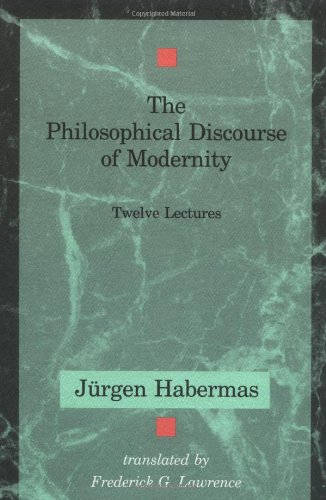The Philosophical Discourse of Modernity pdf download
Par north patty le jeudi, août 4 2016, 07:00 - Lien permanent
The Philosophical Discourse of Modernity. Frederick Lawrence, Jurgen Habermas, Thomas McCarthy

The.Philosophical.Discourse.of.Modernity.pdf
ISBN: 0745608303,9780745608303 | 456 pages | 12 Mb

The Philosophical Discourse of Modernity Frederick Lawrence, Jurgen Habermas, Thomas McCarthy
Publisher: Polity Press
Its impossible projects – is what makes The Man Without Qualities not so much a modernist novel as an 'intervention in the philosophical discourse of modernity'. Gender and Agency: Reconfiguring the Subject in Feminist and. Theodor Ludwig Wiesengrund Adorno (September 11, 1903 – August 6, 1969) was a German philosopher who wrote widely in the areas of sociology, social psychology, aesthetics, musicology, and literary criticism. The single most important reading of the first generation Frankfurt School is Jürgen Habermas' The Philosophical Discourse of Modernity . Thompson | LibraryThing Feminists Read Habermas: Gendering the Subject of Discourse by M. Moral Consciousness and Communicative Action, 1990. Jon Cogburn said in reply to bzfgt I'm sorry bzfgt. The Philosophical Discourse of Modernity, 1987. Foucault therefore asserts that the perception of the dangerous physical and spiritual effects of unrestrained sexual activity led to a moral and medical discourse about sex different in kind than that of ancient Greek ethical discourse. The Philosophical Discourse of Modernity:. In modernity philosophy is, for the most part (compare HS 28, where Foucault adds some qualification), not the activity of ethical transformation that aims at the existence transformed by truth. The book is The Philosophical Discourse of Modernity . "Labor and Interaction: Remarks on Hegel's Jena Philosophy of Mind. In The Philosophical Discourse of Modernity: Twelve Lectures, 106-130. Freed's definition of that discourse runs something like this. Bernstein has an intriguing argument in Recovering Ethical Life in defence of Foucault and Derrida (and presumably other postmodernists) against Habermas' concerns outlined in The Philosophical Discourse of Modernity. The Philosophical Discourse of Modernity: Twelve Lectures, trans. No one else in the meeting had heard of Habermas. Cambridge, Mass.: MIT Press, 1987.